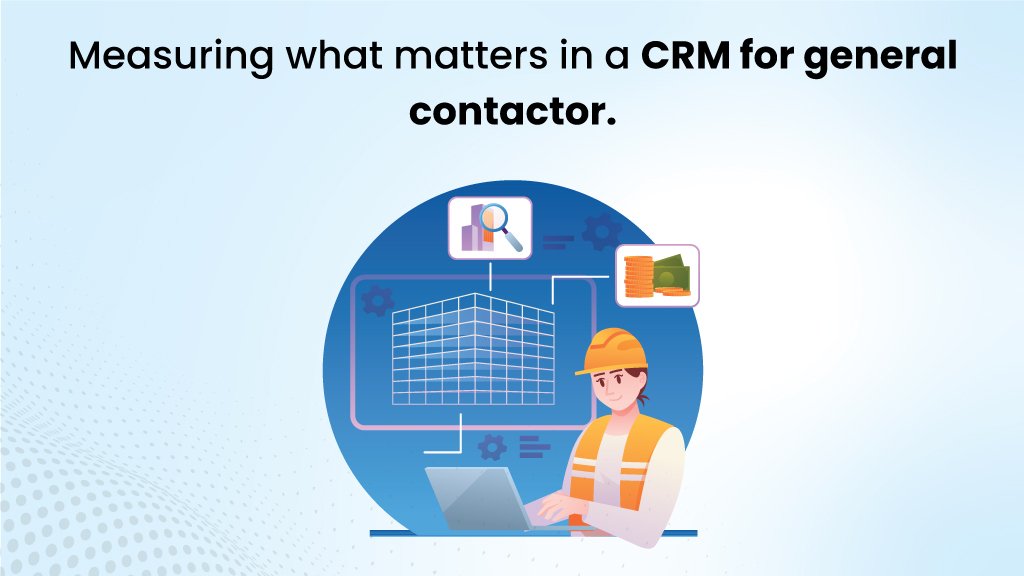Transforming General Contracting with CRM: Streamlining Sales, Project Management, and Customer Relationships
Notepads are a way to jot down notes. Spreadsheets if configured with advanced formulas can be a way to track results. They fall short in managing vendor tracking and fostering customer relationships. A CRM for your organization can give you one source of truth for details on any vendor or customer – b2b or b2c, proposals, contracts and provide real-time analytics on every touch point with them. With all the information organized and available within the system, and/or accessed via a mobile interface sales teams can concentrate on what they do best — selling. Leveraging real-time data to build relationships is a much better plan than simply reacting to calls or emails.

Data analytics for a general contractor has multiple conveniences:
1. Improve the Sales Process: A sales team needs a simple, consistent approach to generate proposals to truly succeed. The sales process generally encompasses the following stages:
- Qualifying Leads — Identifying the scope, time frames and decision-maker
- Generate proposals — Estimate, Pricing and timelines
- Negotiation — Tracking and Finalizing contracts
- Close Deals — Closing deals
- Invoicing – Complete sales cycle
With a CRM, each part of your sales cycle is automated, rid of manual mundane tasks and saves time so the organization can focus on selling and work on building relationships.
2. Track a Sales Pipeline Effectively: A sales pipeline is a way to track the progression of all deals that the sales team is actively involved in, and expects to close within a certain amount of time. A business may be pursuing too many projects that simply aren’t worth it. This waste of time takes focus away from opportunities that boost growth.
- What projects is my sales team bidding on right now?
- What part of the sales process is each sales rep in right now?
- What is the bid due date?
- Which activities (emails, phone calls, meetings) have you completed?
If the answers to these questions are not available on any given day, then the sales pipeline is not tracked effectively.
3. Make Informed Decisions: A deal or an opportunity in the sales pipeline must include the value of an opportunity, timelines such as dates, project details, and all involved stakeholders such as subcontractors. Such access to historical and interactive data, if pulled into a report to analyze opportunities, will provide deeper insight into the current state of the business, and any decision about the sales strategy based on these dates will be much more effective. When a sales team can manage vendor, and customer relationships, track their pipelines, and make informed decisions, the entire organization benefits in the competitive and crowded marketplace.
4. Project Management: Effective project management includes task assignment, milestone tracking, and progress reporting. Project-specific dashboards and calendars are an effective tracking of construction projects, ensuring tasks are completed on time and within budget.
(1) Document Management and Collaboration: This aspect focuses on maintaining an organized system where all project-related documents, including plans, permits, and contracts are readily accessible to authorized personnel.
(2) Estimate and Proposal Management: Manage the proposal process, including tracking RFIs (Requests for Information), RFQs (Requests for Quotation), and RFPs (Requests for Proposal). This feature streamlines the estimate/ proposal process to submit competitive and accurate proposals.
(3) Sub contractor and Supplier Management: Manage sub contractors and suppliers in a database of contacts, and track performance. This feature helps ensure that all project expectations are aligned and accounted for.
5. Mobile Accessibility: The importance of mobile access lies in its ability to facilitate immediate updates, data input, and communication. Morever, this enhances efficiency and communication directly on the job site.
Finally, a CRM system provides mechanisms for accountability and offers various tools for effective management of business customers.
Contact us to learn more about how automated CRM processes can benefit your general contractor business.


